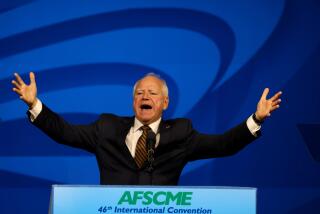Rick Santorum pledges to ‘pull up government by the roots’
Rick Santorum, after finishing far behind Mitt Romney in Illinois, turned his focus Tuesday night to winning his home state of Pennsylvania, which votes in five weeks, styling himself as the only trustworthy conservative and delivering a populist appeal aimed at blue-collar voters.
After mentioning that he had called Romney to congratulate him, Santorum took aim at the front-runner in his election night speech, implying that he was too wealthy and not tough enough to take on President Obama.
“We don’t need a manager,” Santorum said, a reference to Romney’s experience as a businessman. “We need someone who is going to pull up government by the roots and throw it out and do something to liberate the private sector in America.”
Santorum was not in the Land of Lincoln, but in Pennsylvania, the state he grew up in and represented in the U.S. House and Senate until he was trounced in 2006. He did hold his party at the Gettysburg Hotel, however, which is at 1 Lincoln Square.
Speaking under an enormous banner that said, “Freedom,” Santorum stressed his childhood growing up among working-class people, drawing an implicit contrast with Romney, whose father was the head of American Motors and the governor of Michigan. Romney became extraordinarily wealthy as the head of a private equity fund.
“It’s great to have Wall Street experience. I don’t have Wall Street experience,” Santorum said. “But I have experience growing up in a small town in western Pennsylvania, growing up in a steel town, growing up in public housing and apartments, and seeing how men and women of this country scraped and clawed because they had the opportunity to climb the ladder of success in America. A lot of those folks out there today feel like nobody in Washington and no one in this debate is really talking about them.”
Santorum knocked Romney and Newt Gingrich by name for changing their views, noting that they once supported the idea that coal-plant emissions were contributing to global warming. Voters, he said, want a consistent conservative, “someone who is going to go out and stand and fight because it’s not just what the pollster tells him to say, or what’s on their teleprompter.”
Romney, as he often does, delivered his speech with a teleprompter, flubbing a number of his scripted lines. “I don’t happen to have one here tonight,” Santorum quipped to applause and cheers.
Santorum predicted “a big delegate sweep” in Pennsylvania, where 61 will be at stake. “I learned everything, everything, about freedom and opportunity and hard work from growing up with folks who worked in the mills and the mines in western Pennsylvania,” he said.
Before turning to Pennsylvania, Santorum predicted that he would win Illinois outside of Chicago and its suburbs, where Republicans are more moderate. ”We won the areas that conservatives and Republicans populate,” he said, “and we’re very happy about that. We’re happy about the delegates we’re going to get, too.”
Although 54 delegates were up for grabs, Santorum failed to get delegates on the ballot in four congressional districts, forfeiting 10 delegates.
He may have hurt himself in Illinois by taking time away from campaigning there to contest Puerto Rico, where Romney destroyed him after Santorum declared that Puerto Ricans would have to become proficient in English if the territory became a state.
In a bright spot for Santorum in Illinois, Gingrich was running behind Ron Paul in the results, making it even harder for the former House speaker to persuade Republicans he is still a viable candidate. Santorum now turns his attention to Louisiana, which is a more conservative state with many more evangelical voters, much like Alabama and Mississippi, which he won last week.
“We’re feeling very, very good about winning Louisiana on Saturday,” he told supporters.
On Wednesday, he will visit an energy company across the Mississippi River from New Orleans, hold a rally in Mandeville, a suburb across the Lake Pontchartrain Causeway, and worship with pentecostal Christians in Alexandria in the center of the state.
In Illinois, Santorum won those Republican primary voters who described themselves in an exit poll as “very conservative,” but they made up less than a third of the state’s electorate. In contrast, 42% of the GOP voters in Mississippi described their politics as “very conservative.”
Santorum, however, did not win those voters who described themselves as aligned with the views of the tea party. He did win evangelical voters, as he has done consistently throughout the campaign. A devout Catholic, he won Protestants who attend church at least weekly, but not the most observant Catholics.
Santorum, who campaigned largely in more rural, socially conservative areas, won those voters looking for a true conservative or a candidate perceived to have a strong moral character. Romney won those voters looking for a candidate who can beat Obama or has the right experience.
Almost six-tenths of the voters said the economy was their top issue and half of them chose Romney as their candidate. The former Massachusetts governor had kept his focus in Illinois on the economy, emphasizing his 25 years in business. He described himself as an “economic heavyweight” and said Santorum was an “economic lightweight” who would not be able to defeat Obama, whom Romney also described as an “economic lightweight.”
john.hoeffel@latimes.com
Rick Santorum pledges to ‘pull up government by the roots’
More to Read
Get the L.A. Times Politics newsletter
Deeply reported insights into legislation, politics and policy from Sacramento, Washington and beyond. In your inbox three times per week.
You may occasionally receive promotional content from the Los Angeles Times.










